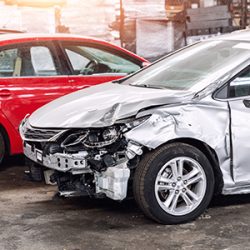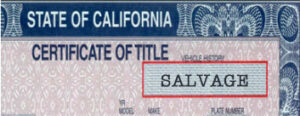What Does Salvage Title Mean When Selling My Car?
What Does Salvage Title Mean When Buying Or Selling A Car?
In California a car gets a salvage title when it has been damaged to a level that the insurance company has concluded that it would it would not be economical to repair it. In other words vehicles will be branded as a total loss or “salvage” when the cost of making necessary repairs after an accident are greater than an estimated percentage of the vehicles total value. A car can be deemed non-repairable or “junk” when they are damaged beyond repair after a major wreck, or after being sold at a junk car auction.
After an insurance company settles a claim, the owner can decide to keep the vehicle that was declared a total loss. If the owner decides to keep their vehicle – they are required by law to apply for a salvage certificate within 10 days of settling the claim. This certificate will then become associated with the car’s Vehicle Identification Number (VIN) in the National Motor Vehicle Title Information Service (NMVTIS). In California, when these cars are offered for sale at a used car dealership they should be displayed with a sticker indicating that they have been branded as a salvage.

Salvage Titles and California Laws Regarding Vehicle Fraud
In California it’s illegal to sell a branded “salvage” title car without disclosing it to the buyer. Certain laws were created to protect consumers from purchasing a branded vehicle unknowingly. Unfortunately car dealers and private parties still knowingly pass off salvage or junk cars to buyers. In some cases, the car was never reported as salvage or junk, so the information does not appear on the car’s official California Certificate of Title. In rare cases, a deceptive seller may have altered the title or VIN so that the buyer cannot tell that the car is salvage. Regardless of how it happens, the unsuspecting buyer of a car with a salvage title is entitled to rescind the purchase (i.e., get their money back), and may have a right to additional money damages through a lawsuit.
Signs That a Car May Be a Salvage or Junked Vehicle
If you believe that a car you purchased was branded as “salvage” or “junk,” look for the following potential signs.
Disclaimer; Just because you see signs of an accident it doesn’t necessarily mean the car has been branded a salvage.
- There is visible repairs to body panels and mismatched paint, There may be other signs like missing front inner wheel wells, body panels and doors not fitting correctly, or severely damaged bumpers.
- The core support in the engine compartment is bent or twisted.
- The airbag covers are resealed, damaged or been replaced with the wrong color cover.
- The VIN number appears to be tampered with or missing completely in common locations like, in drivers door jamb or behind the lower right corner of the windshield.
- The title has been tampered with or is missing all together. If the seller does not have either a current tile or Registration it is best not to purchase the vehicle. Many times the vehicle has not been updated with the DMV so the title will not show a brand in the upper right corner. When the car has a current registration then it will say on it if it has a brand title.
 Its always best to purchase a third party vehicle history report when buying a used car or truck. There are many agencies that supply vehicle history reports. Two of the most popular reporting agencies are Carfax, and AutoCheck, but they’re many more that may cost less. When seriously looking to purchase a used car you may want to purchase reports in bulk, as this will save you money in the long run. If you would like to learn more about vehicle history reporting agencies and get more information about vehicle titles and brands, visit the the NMVTIS website.
Its always best to purchase a third party vehicle history report when buying a used car or truck. There are many agencies that supply vehicle history reports. Two of the most popular reporting agencies are Carfax, and AutoCheck, but they’re many more that may cost less. When seriously looking to purchase a used car you may want to purchase reports in bulk, as this will save you money in the long run. If you would like to learn more about vehicle history reporting agencies and get more information about vehicle titles and brands, visit the the NMVTIS website.
Benefits of getting a Vehicle History Report Like Carfax
We research almost every decision we make about our health, investments, business decisions. We check the backgrounds of doctors, business associates, people we hire. So why not do this when it comes to our used car purchase. Cars have history, so by not checking the vehicle history report it may cost you a lot of money spent on future mechanical repairs. Studying a vehicle history report can help you buy a car or truck that provides years of reliable and safe transportation. These reports contain a wealth of data about a car’s true mileage, damage history, maintenance records, and possible recalls. The report probably won’t say the vehicle is a “lemon” outright, but they can alert you to possible present and future problems.
